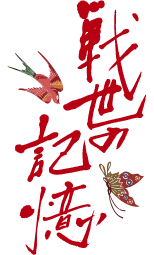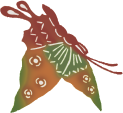
At the battlefield on Iejima Island
"At the battlefield on Iejima Island"
Kiku Tamaki (08玉城キク)
Date of birth: August 15, 1928; 17 years old at the time
Some immense sounds were heard in the morning from the direction of Naha City. I thought it was thunder. The sound gradually moved closer. Before I knew it, numerous aircraft appeared across the sky over Iejima Island. Four planes were flying in formation. This formation in the sky over Iejima Island, circled around two or three times. I thought it was a practice run by the Japanese armed forces. However, when I had a better look at the aircraft I could see the marking of a star. I could tell right away they were aircraft of the US armed forces. With a loud voice I shouted "Air raid!" When I yelled this out, someone from the home guard (boueitai) nearby said "No stupid, it is friendly aircraft. It's just maneuvers." In a loud voice I told that person from the home guard "No sir, there is the marking of a star on the aircraft."
Just an instant after I shouted, they bombarded us with incendiary bombs, conventional bombs and machine gun fire. They started attacking the kitchen facility near the airfield and all the people there. I went to that place the next day. The kitchen facility was burnt and people were charred black, like burnt goats. Their elbows and hands were all bent. Such carcasses were stacked up on top of one another, piled up in heaps. It was such a gruesome sight.
I could not evacuate to the Kabira District, so I hid in another foxhole. I had younger sisters who were three and one and half years old. These younger sisters cried so much. Some people who were together in the foxhole told me "kill those kids." I could not kill my little sisters, so we climbed out of the foxhole and hid below the trees. Some people walking past told us "If you stay there you will not last until tomorrow. You will die very soon." So we joined those people and headed for the Maja District.
Five or six women in the Maja District had not evacuated as they decided to remain there. We thought that it would be better to die together in kirikomi (a raid)than be killed by the American soldiers, so this time we headed to the encampment of the Japanese armed forces, which was constructed on the northern side of the lighthouse on the island. We helped in the construction work of the encampment, so we were familiar with the Japanese soldiers who were stationed there. Once there we asked them to let us join the soldiers in the kirikomi. The soldiers told us "We have already given out all the hand grenades to other people, so we have none left. You must go back and look after your families. When you think that the end is imminent, jump off the cliff to die." So we grudgingly went back to where we were before, which saved our lives.
Kiku Tamaki (08玉城キク)
Date of birth: August 15, 1928; 17 years old at the time
Some immense sounds were heard in the morning from the direction of Naha City. I thought it was thunder. The sound gradually moved closer. Before I knew it, numerous aircraft appeared across the sky over Iejima Island. Four planes were flying in formation. This formation in the sky over Iejima Island, circled around two or three times. I thought it was a practice run by the Japanese armed forces. However, when I had a better look at the aircraft I could see the marking of a star. I could tell right away they were aircraft of the US armed forces. With a loud voice I shouted "Air raid!" When I yelled this out, someone from the home guard (boueitai) nearby said "No stupid, it is friendly aircraft. It's just maneuvers." In a loud voice I told that person from the home guard "No sir, there is the marking of a star on the aircraft."
Just an instant after I shouted, they bombarded us with incendiary bombs, conventional bombs and machine gun fire. They started attacking the kitchen facility near the airfield and all the people there. I went to that place the next day. The kitchen facility was burnt and people were charred black, like burnt goats. Their elbows and hands were all bent. Such carcasses were stacked up on top of one another, piled up in heaps. It was such a gruesome sight.
I could not evacuate to the Kabira District, so I hid in another foxhole. I had younger sisters who were three and one and half years old. These younger sisters cried so much. Some people who were together in the foxhole told me "kill those kids." I could not kill my little sisters, so we climbed out of the foxhole and hid below the trees. Some people walking past told us "If you stay there you will not last until tomorrow. You will die very soon." So we joined those people and headed for the Maja District.
Five or six women in the Maja District had not evacuated as they decided to remain there. We thought that it would be better to die together in kirikomi (a raid)than be killed by the American soldiers, so this time we headed to the encampment of the Japanese armed forces, which was constructed on the northern side of the lighthouse on the island. We helped in the construction work of the encampment, so we were familiar with the Japanese soldiers who were stationed there. Once there we asked them to let us join the soldiers in the kirikomi. The soldiers told us "We have already given out all the hand grenades to other people, so we have none left. You must go back and look after your families. When you think that the end is imminent, jump off the cliff to die." So we grudgingly went back to where we were before, which saved our lives.


